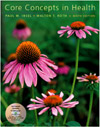 |  Core Concepts in Health, 9/e Paul M. Insel,
Stanford University School of Medicine
Walton T. Roth,
Stanford University School of Medicine
Sexually Transmitted Diseases
Health LinksSTDs General Information HIV/AIDS General Information HIV/AIDS Treatment Information HIV/AIDS Vaccine Development Other STDs Safer Sex Information
HIV/AIDS General Information
| AIDS 101.Com
(http://www.aids101.com)
Provides information about HIV/AIDS and serves as a community for friends and relatives of people who have HIV/AIDS |  |  |  | AIDS Clock
(http://www.unfpa.org/aids_clock/clock.htm)
Sponsored by the United Nations Population Fund, this site is a counter tracking the current number of people infected with HIV worldwide. |  |  |  | AIDS: The Agony of Africa
(http://www.villagevoice.com/specials/africa)
A Pulitzer Prize-winning series of articles in the Village Voice. |  |  |  | AVERT: AIDS Education and Research Trust
(http://www.avert.org)
Provides statistics, information, personal stories, and many other resources related to HIV/AIDS. |  |  |  | The Body/A Multimedia AIDS and HIV Information Resource
(http://www.thebody.com)
Provides basic information about HIV--prevention, testing, treatment--and links to related sites; includes an http://www.thebody.com/surveys/sexsurvey.html online HIV/STDs risk assessment. |  |  |  | CDC Division of HIV/AIDS Prevention
(http://www.cdc.gov/nchstp/hiv_aids/dhap.htm)
Provides statistics, fact sheets, answers to frequently asked questions, links to related sites, and many other HIV/AIDS resources. |  |  |  | Center for AIDS Prevention Studies
(http://www.caps.ucsf.edu)
Information on, and evaluation of, various approaches to HIV prevention. |  |  |  | FDA: Testing Yourself for HIV-1, the Virus that Causes AIDS
(http://www.fda.gov/cber/infosheets/hiv-home2.htm)
Provides information about approved and unapproved home testing kids for HIV. |  |  |  | Harvard AIDS Institute
(http://www.hsph.harvard.edu/hai/home.html)
Provides resources and links on research into basic aspects of the HIV/AIDS epidemic. |  |  |  | HIV InSite: Gateway to AIDS Knowledge
(http://hivinsite.ucsf.edu)
Provides information about prevention, education, testing, treatment, statistics, clinical trials, and new developments. The http://hivinsite.ucsf.edu/InSite.jsp?page=pr-04-03 AIDS Basics section provides answers to frequently asked questions about transmission, symptoms, and prevention. |  |  |  | Joint United Nations Programme on HIV/AIDS
(http://www.unaids.org)
Provides statistics and information on the international HIV/AIDS situation; site features individual country profiles that include general health data as well as estimates of the number of AIDS deaths, AIDS orphans, and people currently living with HIV/AIDS. |  |  |  | Kaiser Family Foundation Daily HIV/AIDS Report
(http://report.kff.org/aidshiv)
Provides daily news on HIV/AIDS. |  |  |  | NAMES Project Foundation AIDS Memorial Quilt
(http://www.aidsquilt.org)
Includes the story behind the quilt, images of quilt panels, and information and links relating to HIV infection. |  |  |  | National Institute of Allergy and Infectious Diseases (NIAID): AIDS Publications
(http://www.niaid.nih.gov/publications/aids.htm)
Includes fact sheets, brochures, and research news about HIV/AIDS. |
|



 2002 McGraw-Hill Higher Education
2002 McGraw-Hill Higher Education